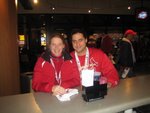
We went to Craigmillar Castle on Sunday. It is a cleverly built castle started around 1400. Its claim to fame is Mary I of Scotland, who arrived there after the birth of her son James I. It was within these walls that the plot to kill her second husband: Henry Stuart, Lord Darnley, was hatched. Darnley was later found in the gardens of Hamiltons' house, Kirk o' Field, Edinburgh, where he had been strangled to death. There had also been an explosion at that house the same night, however, it is unclear whether that was another assassination attempt, or an attempt to cover up the murder.
Craigmillar Castle is impressive upon first sight because of its machicolated battlements. The corbeled arches are not just for decoration. Between each of them is a gap, from which defenders could drop rocks or shoot arrows at attackers trying to batter or sap the castle walls. Once you get atop the battlements you can see that there are also stone drain spouts constructed over these gaps. I imagine this not only kept the defenders' catwalk dry, but also allowed them to pour hot liquids down on the attackers. Indeed, the chimneys of the fireplaces within the castle would often extend in convenient locations where a cauldron of liquid could be placed and slowly boiled. I imagine almost anything would be poured down upon the attackers, including the waste and offal of soldiers having to relieve themselves during the siege.

The round towers are also cleverly constructed, with not only the machicolated battlements once again, but also with a central, flat stone circle where a counter-siege engine or artillery piece could be mounted, or even where additional archers could kneel and fire at attackers.
The internal structure of the castle was much intact and parts even bordered on cozy. Of course, one would need plenty of tapestries and floor rugs to break up the endless cold of stone. Most of the rooms had fireplaces (a necessity in Scotland) and there seemed to be plenty of wall potties, where inhabitants could relieve themselves or where other waste could be dumped. Even the prison in the lowest level had one of these. By this time, it looked like the people were at least a little more aware of hygiene. A few outbreaks of the plague in nearby Edinburgh would do that, I suppose. Even one of the kitchens had a window carved into the an adjoining hall, which sloped down to what looked like a drain, where used broth, bones, and rotten food could be corralled and expunged.
The invention of gunpowder resulted in the adaptation of many parts of the castle. Gun ports were built atop the battlements or carved into the sides of the walls. The cannon quickly made many of the castle defenses obsolete or impractical. It is a wonder that a castle such as Craigmillar survived as intact as it did. Many others we will see have not fared so well.




